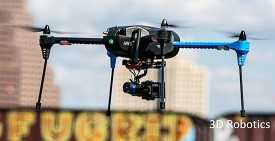Institutions are creating more engaging STEM programs by incorporating drone technology into instruction
 Educators on campuses across the country are using drone technology to teach STEM disciplines, due in large part to what they say is the technology’s ability to offer a real-world and engaging approach to disciplines such as engineering.
Educators on campuses across the country are using drone technology to teach STEM disciplines, due in large part to what they say is the technology’s ability to offer a real-world and engaging approach to disciplines such as engineering.
3D Robotics (3DR) on Jan. 29 launched the DroneEDU program that offers free and discounted drone hardware, sponsorships, and classroom support to help students and educators deploy unmanned aerial vehicles as they explore advanced STEM concepts.
Many undergraduate engineering programs use old equipment to teach students concepts such as heat transfer or aerodynamics, and those somewhat irrelevant pieces of equipment don’t keep students engaged in the material as well as modern equipment, said Brandon Basso, VP of software engineering at 3DR. Most programs also require students to design and build their own systems for an entire semester, and updated equipment prompts students to think about design in modern ways.
Next page: What educators say about drone technology in the classroom
“Those experiences are better if you’re working on something more modern,” Basso said. Using modern and more engaging technologies such as drone technology can give students “the right tools they need to use to conduct good research and be inspired as engineers.”
3DR has donated quadrotors—a form of drone design—and other equipment to institutions across the nation, and educators say the technology has engaged students in new ways.
“Even for college seniors, the task of designing and assembling a functional system in a three-month period is challenging,” said Tom Clark, a development engineer in the University of California, Berkeley’s Mechanical Engineering Department. “With 3DR’s donation of a set of quadrotors, as well as continued support from their engineers, our students have been able to spend less time learning about quadrotor technology that is currently on the market, and instead focus on the developing their own applications or hardware that builds on that technology.”
The DroneEDU program includes:
• Autonomy Unleashed—3DR will offer autopilot sponsorships to educational clubs, organizations, and departments. Programs in elementary through post-graduate levels can receive up to three autopilots by submitting a proposed use case.
• Product discounts—Available to college and university professors, program administrators, and enrolled students for the purchase a 3DR drone or component technology for classroom or program use. To qualify, applicants must enroll for a discount code with a valid .edu email address from any accredited institution.
• Degree-level partnerships and sponsorships—A select number of supported product and beta-testing opportunities for universities offering certifications and advanced degrees in robotics, GIS, and other UAV-related fields.
• 3DR speakers’ bureau—3DR’s technology experts will provide drone demonstrations, keynotes and/or special sessions on integrating UAV technology into new educational fields as availability allows.
“The most exciting thing about the UAV industry is that no one knows exactly how far this technology can take us,” Basso said.
Material from a press release was used in this report.
- 5 trends impacting higher ed’s path in 2024 - May 8, 2024
- Are AI skills more important than degrees? - May 2, 2024
- Report forecasts a ‘surge’ in GenAI adoption - April 26, 2024

